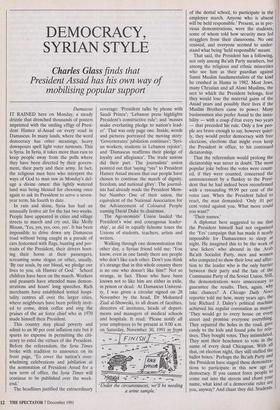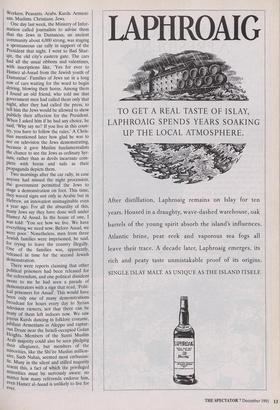DEMOCRACY, SYRIAN STYLE
Charles Glass finds that
President Assad has his own way of mobilising popular support
Damascus IT RAINED here on Monday, a steady drizzle that drenched thousands of posters imprinted with the smiling effigy of Presi- dent Hamez al-Assad on every road in Damascus. In many lands, where the word democracy has other meanings, heavy downpours spell light voter turnouts. This is Syria. In Syria, it takes more than rain to keep people' away from the polls where they have been directed by their govern- ment, their party and their army. In fact, the religious men here who interpret the ways of God to man saw in Monday's del- uge a divine omen: this lightly watered land was being blessed for choosing once again to ask its President to serve a seven- year term, his fourth to date.
In rain and shine, Syria has had an unusually festive air for the last two weeks. People have appeared in cities and village streets to march and cry out, like Molly Bloom, 'Yes, yes, yes, 000, yes'. It has been impossible to drive down any Damascus road without being caught in a parade of cars festooned with flags, bunting and por- traits of the President, their drivers hoot- ing their horns at their passengers, screaming some slogan or other, usually, `By our souls, by our blood, we pledge our lives to you, oh Hamez of God.' School children have been on the march. Workers and peasants have attended mass demon- strations and hours' long speeches. Rich merchants have established tented hospi- tality centres all over the larger cities, where neighbours have been politely invit- ed to come, drink coffee and sing the praises of the air force chief who in 1970 made himself their President.
This country may plead poverty and admit to an 80 per cent inflation rate but it spares no expense in permitting the citi- zenry to extol the virtues of the President. Before the referendum, the Syria Times broke with tradition to announce on its front page, `To cover the nation's over- whelming celebrations and jubilation at the nomination of President Assad for a new term of office, the Syria Times will continue to be published over the week- end.'
The headlines justified the extraordinary coverage: 'President talks by phone with Saudi Prince'; 'Lebanon press highlights President's constructive rule'; and 'masses make everlasting pledge to nation's lead- er'. That was only page one. Inside, words and pictures portrayed the moving story: `Governorates' jubilation continues'; 'Syri- an workers, students in Lebanon rejoice'; and 'Damascus reaffirms their pledge of loyalty and allegiance'. The trade unions did their part. The journalists' union pointed out that 'saying "yes" to President Hamez Assad means that our people have chosen to continue the march of dignity, freedom, and national glory'. The journal- ists had already made the President Mem- ber Number One of their union, the equivalent of the National Association for the Advancement of Coloured People naming David Duke its chairman.
The Agronomists' Union lauded 'the President's wise and courageous leader- ship', as did in equally fulsome tones the Unions of students, teachers, artists and writers.
Walking through one demonstration the other day, a Syrian friend told me: 'You know, even in one family there are people who don't like each other. Don't you think it's strange that in this whole country there is no one who doesn't like him?' Not so strange, in fact. Those who have been known not to like him are either in exile, in prison or dead. At Damascus Universi- ty, I was given a circular signed on 28 November by the head, Dr Mohamed Ziad al-Showeiki, to all deans of faculties, directors of institutes, heads of depart- ments and managers of medical schools and hospitals. It read: 'Please notify all your employees to be present at 9.00 a.m. on Saturday, November 30, 1991 in front ' Under the circumstances, we'll be needing a urine sample.' of the dental school, to participate in the employee march. Anyone who is absent will be held responsible.' Present, as in pre- vious demonstrations, were the students, some of whom told how security men led stragglers from their classrooms. No one resisted, and everyone seemed to under- stand what being 'held responsible' meant.
That said, the President has a following, not only among Ba'ath Party members, but among the religious and ethnic minorities who see him as their guardian against Sunni Muslim fundamentalists of the kind he crushed in Hama in 1982. Most Jews, many Christian and all Alawi Muslims, the sect to which the President belongs, fear they would lose the material gains of the Assad years and possibly their lives if the Muslim Brothers came to power. Many businessmen also prefer Assad to the insta- bility — with a coup d'etat every two years — that preceded his rule. Only a few peo- ple are brave enough to say, however quiet- ly, they would prefer democracy with free elections, elections that might even keep the President in office, to his continued dictatorship.
That the referendum would prolong the dictatorship was never in doubt. The most popular joke before the votes were count- ed, if they were counted, concerned the announcement by a flunkey to the Presi- dent that he had indeed been reconfirmed with a resounding 99.99 per cent of the votes cast. When the President failed to react, the man demanded: 'Only .01 per cent voted against you. What more could you want?'
`Their names.'
A diplomat here suggested to me that the President himself had not organised the 'Yes' campaign that has made it nearly impossible for Damascenes to sleep at night. He imagined this to be the work of `arse tickers' who abound in the Arab Ba'ath Socialist Party, men and women who competed to show their love and affec- tion to the leader who is the only barrier between their party and the fate of the Communist Party of the Soviet Union. Still, the demonstrations were unnecessary to guarantee the results. Then, again, whY take chances? A Chicago Daily News reporter told me how, many years ago, the late Richard J. Daley's political machine achieved his regular coronation as mayor: `They would go to every house on every street and promise everyone everything. They repaired the holes in the road, gave candy to the kids and found jobs for rela- tives. They bought votes. They intimidated. They sent their henchmen to vote in the name of every dead Chicagoan. With all that, on election night, they still stuffed the ballot boxes.' Perhaps the Ba'ath Party and the President have staged these demonstra- tions to participate in this new age of democracy. If you cannot force people to come out into the streets and chant your name, what kind of a democratic ruler are you, anyway? And chant they did. Students.
Workers. Peasants. Arabs. Kurds. Armeni- ans. Muslims. Christians. Jews.
One day last week, the Ministry of Infor- mation called journalists to advise them that the Jews in Damascus, an ancient Community about 4,000 strong, was staging a spontaneous car rally in support of the President that night. I went to Bad Shar- qie, the old city's eastern gate. The cars had all the usual ribbons and valentines, with inscriptions like, 'Yes for ever to Hamez al-Assad from the Jewish youth of Damascus'. Families of Jews sat in a long row of cars waiting for the word to begin driving, blowing their horns. Among them I found an old friend, who told me that government men had called them only that night, after they had called the press, to tell him the Jews would be allowed to show publicly their affection for the President. When I asked him if he had any choice, he said, 'Why say no? If you live in this coun- try, you have to follow the rules.' A Chris- tian mentioned later how glad he was to see on television the Jews demonstrating, because it gave Muslim fundamentalists the chance to see the Jews as ordinary Syr- ians, rather than as devils incarnate com- plete with horns and tails as their propaganda depicts them. Two mornings after the car rally, in case anyone had missed the night procession, the government permitted the Jews to stage a demonstration on foot. This time, they waved signs not only in Arabic but in Hebrew, an innovation unimaginable even a year ago. For all the absurdity of this, many Jews say they have done well under Hamez Al Assad. In the house of one, I was told: 'You see how we live. We have everything we need now. Before Assad, we were poor.' Nonetheless, men from three Jewish families were imprisoned, he said, for trying to leave the country illegally. One of the families was, apparently, released in' time for the second Jewish demonstration.
There were reports claiming that other political prisoners had been released for the referendum, and one political dissident swore to me he had seen a parade of d. emonstrators with a sign that read, 'Polit- ical prisoners for Assad'. This would have been only one of many demonstrations broadcast for hours every day to Syrian television viewers, not that there can be many of them left indoors now. We saw Joyous Kurds dancing in folklore costume, Jubilant Armenians in Aleppo and raptur- ous Druze near the Israeli-occupied Golan Heights. Members of the Sunni Muslim Arab majority could also be seen pledging their allegiance, but members of the minorities, like the Shi'ite Muslim million- aire, Saeb Nahas, seemed most enthusias- tic. Many in the silent and stilled majority resent this, a fact of which the privileged Minorities must be nervously aware: no matter how many referenda endorse him, even Hamez al-Assad is unlikely to live for ever.



























































 Previous page
Previous page